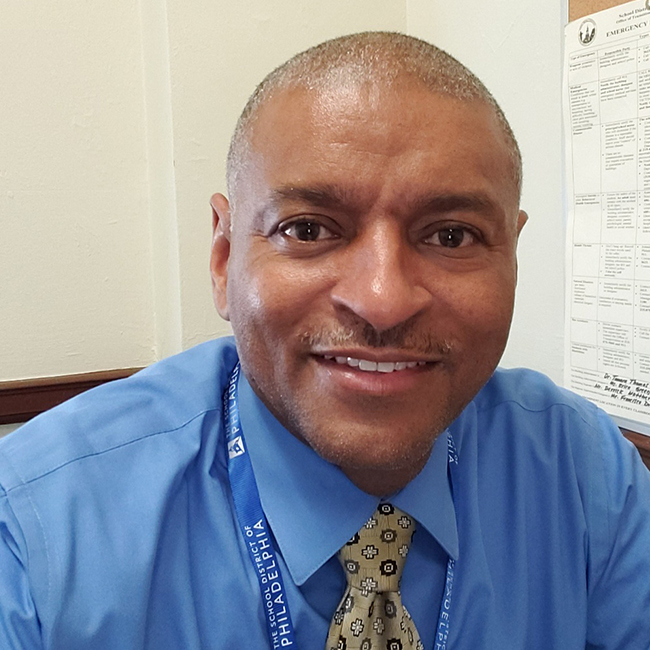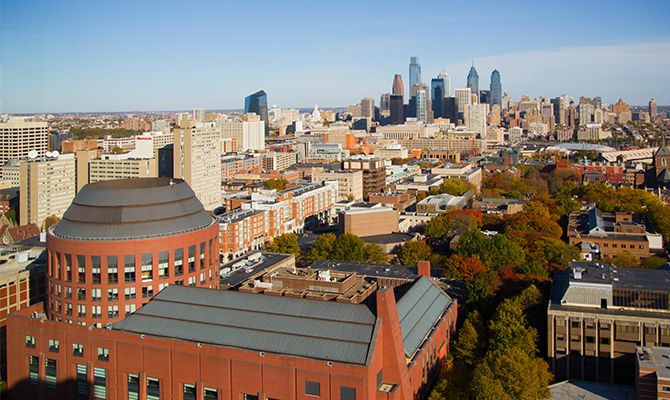
Climate Manager at School District of Philadelphia
Master of Philosophy in Liberal Arts, University of Pennsylvania ’23
Master of Science in Organizational Management and Leadership, Springfield College ’08
Bachelor of Science in Human Services and Criminal Justice, Springfield College ’05
As the Climate Manager for Russell H. Conwell Middle Magnet School, James Washington (Master of Philosophy in Liberal Arts ’23) spends a lot of time coaching his young charges in the positive values that will help them thrive at school and beyond. There are the six pillars of character (trustworthiness, respect, responsibility, fairness, caring, and citizenship) to guide classroom conduct, and acronyms like THINK (Truthful, Helpful, Inspiring, Necessary, Kind) to help students evaluate their social interactions in person and online. James practices what he preaches: as a recent graduate of the Master of Philosophy in Liberal Arts (MPhil) at the University of Pennsylvania, he has drawn on those six pillars of character to manage his time, stay organized, and communicate with his professors. “I’m lucky because we have it on the wall over there,” he jokes. “I never missed a class at Penn. I always wanted to be there, but I also wanted to be an example for my students and my classmates. They saw that I was always on time and always prepared. When you’re taking a college course, you need someone to get the conversation started, and most of the times it was me.”
The interdisciplinary MPhil program is not James’ first experience in the classroom as a working adult; on advice from his peers in the Philadelphia Police Department, where he served as a police officer for twenty years, he obtained his bachelor’s degree and a master’s degree in organizational management and leadership. His degrees helped him transition from a career in law enforcement to education—bolstered by his experience teaching teenagers to play baseball and basketball in the Police Athletic League as well as instructing new recruits in the policy academy. Now a full-time employee of the Philadelphia School District, James still works with a junior military program on the weekends, and his middle school flag football program was recently covered by 6ABC Action News. “I just really wanted to have an opportunity to positively impact the lives of young people,” he says. “I'm always trying to inspire young people to be the best that they can, to be the best that they possibly can be.”
James began to consider an additional degree with a liberal arts or humanities focus to support his goal of teaching college classes on evenings and weekends. “I asked myself: What could I possibly teach that could engage young people? And I thought of philosophy, because you can do pretty much anything with philosophy, and Penn had an excellent program,” he says. Yet he had some hesitations; while his children were grown, he was caring for his mother as she recovered from cancer; he wondered whether he would be able to balance coursework with his work, community, and family responsibilities. “It was so intimidating. I thought that I would just drown and not be able to recover,” he recalls. “I said, I don't think I'm ready.” What changed his mind is encouragement from his family—galvanized by his mother’s improving health—and a conversation with MPhil director, Dr. Chris Pastore. “He said one thing to me that made me think I could do it. He said, ‘Have fun.’ And I said to myself, how do you have fun at Penn?” he laughs. “But when he told me to have fun, I felt confident I could do that.”
As an MPhil student, James chose some courses that could be considered fun—such as Fashioning Gender, a perennial favorite—and other courses that helped him understand pressing global issues. In Nationalism and Ethnic Conflict in Film, he studied genocide in Rwanda; in a course focused on environmental issues, he wrote a paper on Hurricane Katrina that contributed to his understanding of climate change today. “All of these different things that allow me to do some reflection on things that I have experienced in life,” says James. As for his concerns about the courseload, he explains, “I took one item at a time. And when I did one item at a time, I completed this, I completed that, I started progressing. Some of my classes, I used to stay behind and ask questions. There’s nothing wrong with asking for help.”
In the course of writing blog posts for a class assignment, James was surprised to learn he had a talent for writing. “I just started writing about all the things that I had experienced and what I had observed and what I had to deal with within a 30-minute period of traveling to work,” he recalls. “Our school building is in the heart of Kensington, the epicenter of the opioid situation. Coming out of our school building, you have to step over needles, or step over people who have overdosed. We’re constantly having lockdown drills. But once you get inside our school building, there’s something special that goes on with our children. They really forget about what they have to deal with.” Through his writing, his classmates got a first-person perspective on a troubled neighborhood and widespread social challenges that are often only discussed in the abstract. This would become the kernel of his MPhil thesis project: a multidisciplinary study of Kensington combining history, research data, and his written reflections connecting everything together. “Penn is just unlimited in the things that they have available to their students. If they don't have it, then they're going to connect you with other resources, so you can always find answers to questions you pose within your research,” he says.
James coaches his students to be solution-minded when they encounter conflict or obstacles, but felt that the same approach was not appropriate for the scope of his project. “I don’t really have any solutions, because the problem is so much more than what one person can provide. But I’m very happy that I’m working in conjunction with other organizations,” he says. For example, creating a safe passage for middle-grade children to travel to and from the school building is a partnership with the school district, law enforcement, and the sanitation department among other agencies. Beyond cooperation, he says, his work—regardless of which side of the desk he’s on—is sustained by remembering what’s important. “You have to be committed. It doesn’t matter if you’re not feeling well, if you’re tired or feeling overwhelmed. Do I get discouraged when I see human feces by my car when I come out in the afternoon? Absolutely. But if I let that discourage me, I wouldn't be any good to our young people. If we refocus our attention on young people, we will be recharged, rejuvenated, and able to do it all over again the next day.”
And it’s nice to take a moment to celebrate and enjoy your accomplishments, says James. A year before he completed the program, James watched the University of Pennsylvania Commencement ceremony and got chills watching students from schools across Penn process across the campus. “This year, I had the chance to experience that. That was the best feeling in the world—to see my family inside Franklin Field, it just doesn’t get any better than that,” he reflects. “I don't want to sound corny, but I really love Penn.”






